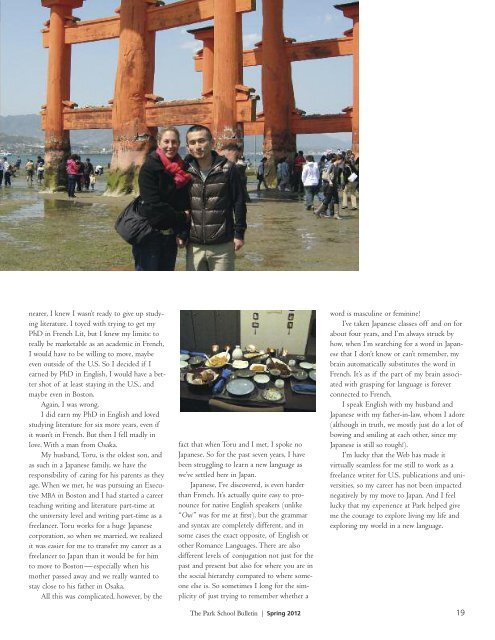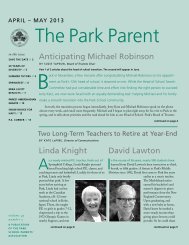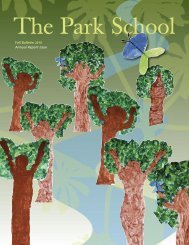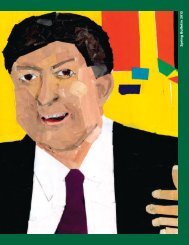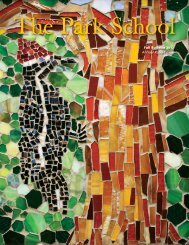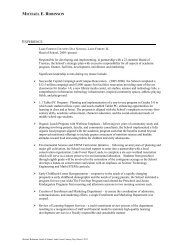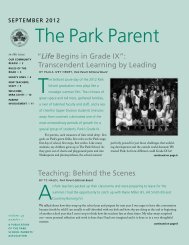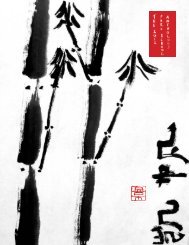Spring Bulletin 2012 - The Park School
Spring Bulletin 2012 - The Park School
Spring Bulletin 2012 - The Park School
You also want an ePaper? Increase the reach of your titles
YUMPU automatically turns print PDFs into web optimized ePapers that Google loves.
nearer, I knew I wasn’t ready to give up studying<br />
literature. I toyed with trying to get my<br />
PhD in French Lit, but I knew my limits: to<br />
really be marketable as an academic in French,<br />
I would have to be willing to move, maybe<br />
even outside of the U.S. So I decided if I<br />
earned by PhD in English, I would have a better<br />
shot of at least staying in the U.S., and<br />
maybe even in Boston.<br />
Again, I was wrong.<br />
I did earn my PhD in English and loved<br />
studying literature for six more years, even if<br />
it wasn’t in French. But then I fell madly in<br />
love. With a man from Osaka.<br />
My husband, Toru, is the oldest son, and<br />
as such in a Japanese family, we have the<br />
responsibility of caring for his parents as they<br />
age. When we met, he was pursuing an Executive<br />
MBA in Boston and I had started a career<br />
teaching writing and literature part-time at<br />
the university level and writing part-time as a<br />
freelancer. Toru works for a huge Japanese<br />
corporation, so when we married, we realized<br />
it was easier for me to transfer my career as a<br />
freelancer to Japan than it would be for him<br />
to move to Boston —especially when his<br />
mother passed away and we really wanted to<br />
stay close to his father in Osaka.<br />
All this was complicated, however, by the<br />
fact that when Toru and I met, I spoke no<br />
Japanese. So for the past seven years, I have<br />
been struggling to learn a new language as<br />
we’ve settled here in Japan.<br />
Japanese, I’ve discovered, is even harder<br />
than French. It’s actually quite easy to pronounce<br />
for native English speakers (unlike<br />
“Oui” was for me at first), but the grammar<br />
and syntax are completely different, and in<br />
some cases the exact opposite, of English or<br />
other Romance Languages. <strong>The</strong>re are also<br />
different levels of conjugation not just for the<br />
past and present but also for where you are in<br />
the social hierarchy compared to where someone<br />
else is. So sometimes I long for the simplicity<br />
of just trying to remember whether a<br />
word is masculine or feminine!<br />
I’ve taken Japanese classes off and on for<br />
about four years, and I’m always struck by<br />
how, when I’m searching for a word in Japanese<br />
that I don’t know or can’t remember, my<br />
brain automatically substitutes the word in<br />
French. It’s as if the part of my brain associated<br />
with grasping for language is forever<br />
connected to French.<br />
I speak English with my husband and<br />
Japanese with my father-in-law, whom I adore<br />
(although in truth, we mostly just do a lot of<br />
bowing and smiling at each other, since my<br />
Japanese is still so rough!).<br />
I’m lucky that the Web has made it<br />
virtually seamless for me still to work as a<br />
freelance writer for U.S. publications and universities,<br />
so my career has not been impacted<br />
negatively by my move to Japan. And I feel<br />
lucky that my experience at <strong>Park</strong> helped give<br />
me the courage to explore living my life and<br />
exploring my world in a new language.<br />
<strong>The</strong> <strong>Park</strong> <strong>School</strong> <strong>Bulletin</strong> | <strong>Spring</strong> <strong>2012</strong> 19


